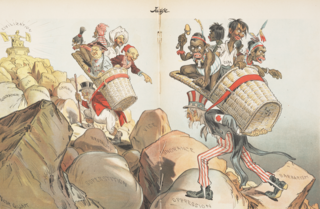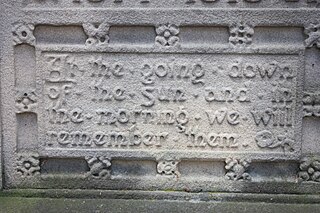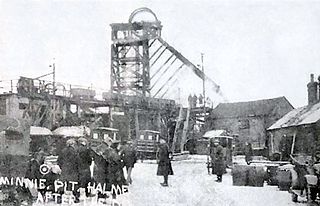Related Research Articles

Fenrir or Fenrisúlfr, also referred to as Hróðvitnir and Vánagandr, is a monstrous wolf in Norse mythology. In Old Norse texts, Fenrir plays a key role during the events of Ragnarök, where he is foretold to assist in setting the world aflame, resulting in the collapse of humanity and society, and kill the god Odin.

Wilfred Edward Salter Owen MC was an English poet and soldier. He was one of the leading poets of the First World War. His war poetry on the horrors of trenches and gas warfare was much influenced by his mentor Siegfried Sassoon and stood in contrast to the public perception of war at the time and to the confidently patriotic verse written by earlier war poets such as Rupert Brooke. Among his best-known works – most of which were published posthumously – are "Dulce et Decorum est", "Insensibility", "Anthem for Doomed Youth", "Futility", "Spring Offensive" and "Strange Meeting". Owen was killed in action on 4 November 1918, a week before the war's end, at the age of 25.

The Speech to the Troops at Tilbury was delivered on 9 August Old Style 1588 by Queen Elizabeth I of England to the land forces earlier assembled at Tilbury in Essex in preparation for repelling the expected invasion by the Spanish Armada.

Robert Laurence Binyon, CH was an English poet, dramatist and art scholar. Born in Lancaster, England, his parents were Frederick Binyon, a clergyman, and Mary Dockray. He studied at St Paul's School, London and at Trinity College, Oxford, where he won the Newdigate Prize for poetry in 1891. He worked for the British Museum from 1893 until his retirement in 1933. In 1904 he married the historian Cicely Margaret Powell, with whom he had three daughters, including the artist Nicolete Gray.

Harold Edward Monro was an English poet born in Brussels, Belgium. As the proprietor of the Poetry Bookshop in London, he helped many poets to bring their work before the public.
"Dulce et Decorum est" is a poem written by Wilfred Owen during World War I, and published posthumously in 1920. Its Latin title is from a verse written by the Roman poet Horace: Dulce et decorum est pro patria mori. In English, this means "it is sweet and fitting to die for one's country". The poem is one of Owen's most renowned works; it is known for its horrific imagery and its condemnation of war. It was drafted at Craiglockhart in the first half of October 1917 and later revised, probably at Scarborough, but possibly at Ripon, between January and March 1918. The earliest known manuscript is dated 8 October 1917 and is addressed to the poet's mother, Susan Owen, with the note "Here is a gas poem done yesterday ."

"Do not go gentle into that good night" is a poem in the form of a villanelle by Welsh poet Dylan Thomas (1914–1953), and is one of his best-known works. Though first published in the journal Botteghe Oscure in 1951, the poem was written in 1947 while Thomas visited Florence with his family. The poem was subsequently included, alongside other works by Thomas, in In Country Sleep, and Other Poems and Collected Poems, 1934–1952. The poem entered the public domain on 1 January 2024.
Jessie Pope was an English poet, writer, and journalist, who remains best known for her patriotic, motivational poems published during World War I. Wilfred Owen wrote his 1917 poem Dulce et Decorum est to Pope, whose literary reputation has faded into relative obscurity as those of war poets such as Owen and Siegfried Sassoon have grown.
Ubi sunt is a rhetorical question taken from the Latin Ubi sunt qui ante nos fuerunt?, meaning "Where are those who were before us?" Ubi nunc...? is a common variant.

"The White Man's Burden" (1899), by Rudyard Kipling, is a poem about the Philippine–American War (1899–1902) that exhorts the United States to assume colonial control of the Filipino people and their country. Originally written to celebrate the Diamond Jubilee of Queen Victoria, the jingoistic poem was replaced with the sombre "Recessional" (1897), also a Kipling poem about empire.

"The Hollow Men" (1925) is a poem by the modernist writer T. S. Eliot. Like much of his work, its themes are overlapping and fragmentary, concerned with post–World War I Europe under the Treaty of Versailles, hopelessness, religious conversion, redemption and, some critics argue, his failing marriage with Vivienne Haigh-Wood Eliot. It was published two years before Eliot converted to Anglicanism.

"For the Fallen" is a poem written by Laurence Binyon. It was first published in The Times in September 1914. It was also published in Binyon's book "The Winnowing Fan : Poems On The Great War" by Elkin Mathews, London, 1914.
"Mental Cases" is one of Wilfred Owen's more graphic poems. It describes war-torn men suffering from post-traumatic stress disorder, otherwise known as shell shock. Owen based the poem on his experience of Craiglockhart Military Hospital, near Edinburgh, where he was invalided in the summer of 1917 with neurasthenia, and became the patient of Dr A.J. Brock. Using imagery of death and violence, Owen presents a chilling portrait of men haunted by their experiences.
"A New Heaven" is a sonnet by Wilfred Owen, written in England before Owen had seen active service in the trenches of France, probably in September 1916. Some MS drafts bear differing dedications. The poem was probably written in Milford Camp, Surrey, which was a part of Witley Camp.

"Miners" is a poem by Wilfred Owen. He wrote the poem in Scarborough in January 1918, a few weeks after leaving Craiglockhart War Hospital where he had been recovering from a shell-shock. Owen wrote the poem in direct response to the Minnie Pit Disaster in which 156 people died.
"Night" is a poem in the illuminated 1789 collection Songs of Innocence by William Blake, later incorporated into the larger compilation Songs of Innocence and of Experience. "Night" speaks about the coming of evil when darkness arrives, as angels protect and keep the sheep from the impending dangers.
With an Identity Disc is a poem written by English poet Wilfred Owen. The poem was drafted on 23 March 1917.

Soldier's Dream is a poem written by English war poet Wilfred Owen. It was written in October 1917 in Craiglockhart, a suburb in the south-west of Edinburgh (Scotland), while the author was recovering from shell shock in the trenches, inflicted during World War I. The poet died one week before the Armistice of Compiègne, which ended the conflict on the Western Front.

Poems was a quarto volume of poetry by Wilfred Owen published posthumously by Chatto and Windus in 1920. Owen had been killed on 4 November 1918. It has been described as "perhaps the finest volume of anti-war poetry to emerge from the War".